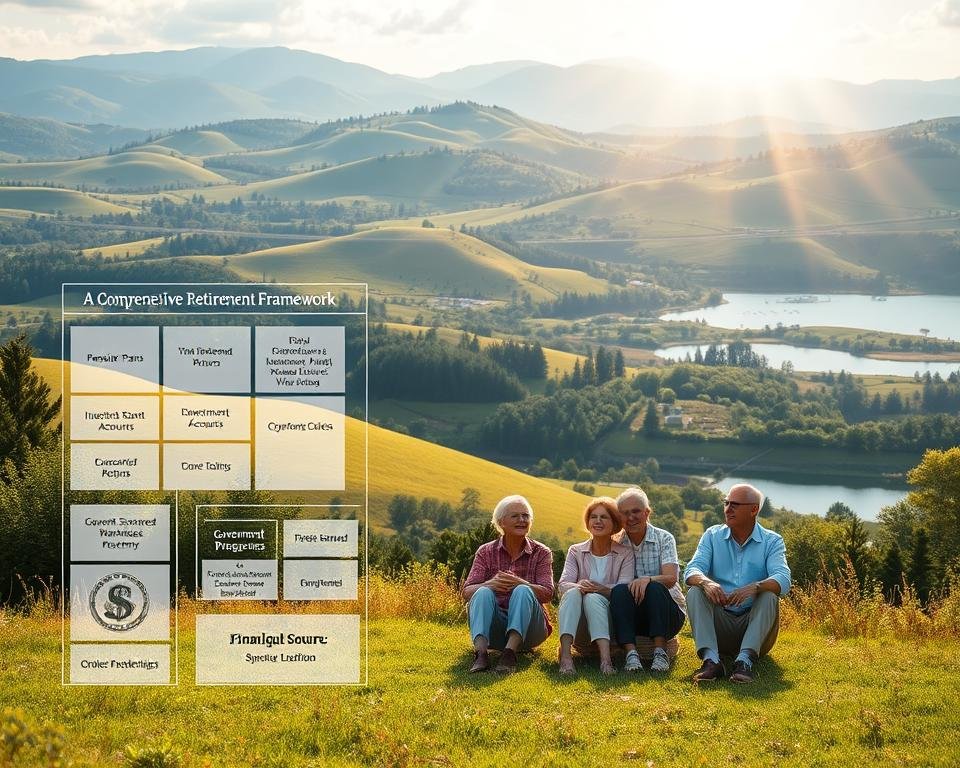Imagine waking up each day knowing your savings grow steadily—even while you sip coffee or explore new hobbies. Sounds too good? It’s not. Many Americans are discovering how established systems can turn their hard-earned skills into reliable cash flow during retirement.
This approach isn’t about starting from scratch. Instead, it uses proven frameworks backed by training and brand recognition. Think of it as a bridge between staying active and enjoying flexibility. You’ve spent decades building expertise—why not let it work for you now?
Stories abound of people like you who’ve transformed their post-career lives. One couple turned a modest investment into a thriving local service provider, relying on corporate support to handle daily operations. Another individual scaled three locations in five years, all while traveling the country.
This guide breaks down how to evaluate opportunities, understand costs, and tap into built-in networks. Whether you prefer hands-off management or occasional involvement, there’s a path tailored to your vision of retirement.
Key Takeaways
- Turn career experience into a low-risk venture with ready-made systems
- Balance leisure with purposeful engagement through flexible structures
- Access corporate training and marketing resources from day one
- Explore options matching different investment levels and time commitments
- Build lasting value that can benefit future generations
Understanding the Franchise Landscape in Retirement
Navigating new ventures after decades in the workforce might seem daunting, but structured business approaches offer unique advantages. These systems let you leverage decades of expertise while maintaining control over your schedule. Let’s explore how modern strategies align with post-career goals.
Defining Tailored Earnings Streams
Imagine revenue that flows from a turnkey operation requiring minimal daily oversight. Unlike rental properties or stock dividends, this model provides:
- Pre-designed operational blueprints tested across multiple markets
- Ongoing corporate support for staffing and marketing
- Scalable involvement based on your preferences
A former school administrator turned fitness studio owner shares: “The training modules helped me transition smoothly—I focus on community partnerships while managers handle day-to-day tasks.”
Modern Adaptations for Later-Stage Entrepreneurs
Today’s opportunities prioritize flexibility over rigid commitments. Semi-absentee roles allow you to:
- Delegate operations to trained teams
- Access real-time performance data remotely
- Adjust involvement during travel or family time
Brands now offer condensed training programs recognizing your existing management skills. For instance, a structured investment path in senior care might utilize your healthcare background without requiring full-time oversight.
Benefits of Franchising in Your Retirement Journey
Retirement opens doors to new possibilities where your experience becomes a foundation for growth. By aligning with proven systems, you create opportunities that extend beyond immediate gains. Let’s explore how this path supports both your lifestyle and long-term aspirations.

Legacy Building and Financial Security
Imagine leaving a tangible asset that supports your loved ones for years. Structured ventures let you grow savings while establishing a lasting impact. One couple transformed their nest egg into a home services brand their grandchildren now manage. Their story shows how strategic planning turns effort into generational wealth.
Flexible Work-Life Balance and Personal Fulfillment
You choose how much time to invest. Pre-built operations mean less daily grind and more freedom to travel or volunteer. A former teacher shares: “I review reports weekly but spend most days mentoring students—it’s the perfect mix of purpose and relaxation.”
These models reduce risk through corporate-backed training and marketing. Whether you prefer quarterly check-ins or monthly strategy sessions, the framework adapts to your rhythm. It’s about crafting a retirement that reflects your values—not someone else’s schedule.
Strategies for franchise passive income retirees
What if your career knowledge could become your greatest asset in this new chapter? The secret lies in aligning your strengths with systems designed for seamless entry. Let’s explore how to turn expertise into a springboard for growth.
Leveraging Your Skills and Industry Experience
Your decades of work aren’t just memories—they’re launchpads. A former accountant transformed her number-crunching prowess into a thriving tax preparation service. “Understanding financial patterns helped me spot a perfect match,” she notes. This strategic alignment reduces ramp-up time and taps into existing professional networks.
Three steps help identify ideal matches:
- Audit transferable skills from your field (project management, client relations)
- Match them to proven frameworks needing those exact competencies
- Prioritize ventures with built-in training for quick adaptation
Consider Bob, a retired logistics manager who chose a shipping solutions provider. His supply chain knowledge helped him outpace other owners in his region. “I knew where bottlenecks would appear,” he explains. By month six, his location ranked top in customer satisfaction.
Tools like skill-mapping workshops and industry trend reports simplify decision-making. Many organizations offer free assessments to connect your background with suitable models. The goal? Turn what you already know into what you’ll confidently grow.
Evaluating Franchise Business Models
Choosing the right path for your next chapter requires clarity about financial commitments and operational needs. Let’s break down how to assess opportunities that align with your goals while minimizing surprises.

Breaking Down Initial Commitments
Start by examining three key factors:
- Upfront investments ranging from $10k to $300k+
- Ongoing fees like royalties (typically 4-12% of revenue)
- Hidden expenses for permits or specialized equipment
A home cleaning service owner shares: “Our training program cost $18k upfront—worth every penny for the instant brand recognition.” Compare options where corporate partners handle inventory management or site selection to reduce your workload.
Measuring Organizational Backing
Strong systems separate sustainable ventures from shaky ones. Look for:
- Comprehensive onboarding programs
- 24/7 technical assistance
- Marketing collateral you can customize locally
One fitness studio founder notes: “The operations manual saved 100+ hours in setup time—we launched 3 weeks ahead of schedule.” Ask providers about their crisis management protocols and renewal terms during discovery calls.
Always request itemized cost breakdowns and success metrics from existing owners. This due diligence helps you spot models built for longevity versus quick sales pitches.
Key Considerations for Retirees Choosing a Franchise
Your golden years deserve ventures that fit like your favorite shoes—comfortable yet purposeful. Making smart choices requires balancing passion with practicality. Let’s explore how to match opportunities with your unique goals.
Aligning with Your Personal Interests and Expertise
Start by asking: “What excites me enough to spend 5-10 hours weekly?” A former marketing executive turned bakery owner explains: “Mixing creativity with client interactions felt natural—like my career’s second act.”
Three alignment strategies work best:
- Audit transferable skills from past roles
- Research industries needing those strengths
- Test compatibility through discovery days
One couple combined their love for pets with healthcare backgrounds to launch a mobile grooming service. Their existing networks helped secure partnerships with veterinary clinics quickly.
Measuring Risk, Return, and Long-Term Viability
Look beyond flashy brochures. Analyze five-year financial disclosures and talk to current owners. Ask pointed questions:
- How quickly did you break even?
- What ongoing support does corporate provide?
- Has client demand remained steady?
A senior who evaluated six options shares: “The winning choice had clear renewal terms and territory protection—critical for lasting stability.” Review industry trends using tools like IBISWorld reports to spot growing vs. saturated markets.
Balance comes from pairing what you love with what the numbers prove. Your perfect match exists where enthusiasm meets evidence.
Top Franchise Opportunities for Retirees
Your next chapter deserves ventures that blend purpose with practicality. Let’s explore models that turn your expertise into community impact without demanding endless hours.
Thriving in Essential Services
Three sectors stand out for those seeking meaningful engagement:
- Cost reduction specialists like P3 Cost Analysts (investment: $110k-$140k) help businesses streamline expenses
- Tax preparation services such as Liberty Tax offer turnkey systems with $50k-$75k startup costs
- Senior support networks including Home Helpers Home Care ($100k-$135k) address growing needs in aging communities
These models provide built-in training and regional exclusivity. As one HomeVestors owner notes: “The corporate team handles contractor vetting so I focus on client relationships.”
Proven Paths to Purposeful Work
Meet those who’ve made the leap:
A former teacher partnered with Tutor Doctor, using her education background to grow a $250k/year tutoring service. “The curriculum guides eliminated guesswork,” she shares.
An ex-nurse chose Care Patrol to match families with senior living options. “My healthcare experience helps clients trust our recommendations,” she explains. Her team now serves three counties.
These stories show how aligning skills with ready-made systems creates both income and fulfillment. The right match lets you contribute meaningfully while maintaining the freedom you’ve earned.
Exploring Passive Income Strategies Beyond Franchises
Your golden years could bloom with opportunities you haven’t yet imagined. While established systems offer stability, digital platforms create fresh paths to grow your nest egg. Let’s uncover how modern tools let you monetize hobbies or expertise from your living room.
Online Ventures and E-commerce Options
Turn creative passions into profit with minimal effort. Platforms like Etsy let artisans sell handmade goods globally, while Amazon handles storage and shipping through FBA programs. One woodworker shares: “I upload designs once, and orders flow automatically—it’s like having a 24/7 craft fair.”
Three low-touch models stand out:
- Content creation: Build a YouTube channel around your niche, earning through ads and sponsorships
- Print-on-demand: Design custom apparel or home decor without inventory risks
- Dropshipping: Partner with suppliers to fulfill orders directly to customers
These approaches leverage existing marketing ecosystems. Social media algorithms can promote your products while you focus on quality control. A former teacher now sells educational printables online: “My website does the heavy lifting—I update materials quarterly and enjoy steady checks.”
Evaluate options by testing demand through Google Trends or Etsy’s search analytics. Start small, scale smart, and watch your home transform into a launchpad for new adventures.
Personalizing Your Path to Retirement Entrepreneurship
Your golden years should reflect who you are—not a cookie-cutter plan. The secret sauce? Blending your career history with ventures that spark joy while delivering results. Let’s craft a roadmap that honors your expertise and lifestyle goals.

Matching Your Career History to Business Models
Think of your professional journey as a treasure map. A former HR director transformed her people skills into a staffing agency partnership. “Recruiting felt familiar, but the corporate marketing tools gave me new superpowers,” she says. Follow this three-step filter:
- Inventory transferable strengths like client relations or budgeting
- Seek models needing those exact skills
- Test-drive options through owner shadow programs
Time management becomes your secret weapon. Allocate hours like a pro: two mornings weekly for financial reviews, afternoons free for grandkids. One bakery owner shares: “I knead dough Tuesdays only—the team handles the rest.”
Is a structured venture your ideal starting point? Ask:
- Does corporate training fill my knowledge gaps?
- Can I scale involvement during travel seasons?
- Will local demand support this choice for 5+ years?
A retired nurse turned senior care consultant puts it best: “I wanted purpose without paperwork. The brand handles compliance; I focus on family connections.” Your perfect match exists where legacy meets liberation.
Financial Planning and Investment Considerations
Smart money moves begin with clear-eyed planning. Whether you’re eyeing a local service provider or specialty shop, understanding cash flow needs prevents surprises down the road. Let’s map out strategies to protect your nest egg while building something lasting.
Budgeting for Startup Costs and Ongoing Expenses
Initial investments vary widely—think $50k for tutoring services up to $300k for full-service operations. One home inspection business owner shares: “Our $28k training fee included everything from software to branded vehicles—no guesswork needed.” Watch for recurring costs like:
- Royalty fees (4-12% of monthly revenue)
- Local marketing fund contributions
- Equipment maintenance contracts
Create separate accounts for emergency repairs and seasonal slumps. A coffee kiosk owner learned this hard way: “Winter sales dipped 40%—thankfully our reserve fund covered payroll.”
Navigating Funding Options and Avoiding Hidden Fees
SBA loans remain popular, offering rates under 7% for qualified applicants. Some company partnerships provide in-house financing—like a senior care brand covering 25% of startup costs for veterans. Always review:
- Territory exclusivity clauses
- Renewal fee structures
- Early termination penalties
ROBS plans let you tap retirement funds penalty-free, but consult a tax advisor first. As one financial planner notes: “A detailed budget is your best defense against cost creep—measure twice, spend once.”
Leveraging Brand Support, Training, and Networks
Your next venture doesn’t have to be a solo journey—established networks amplify your efforts from day one. Picture stepping into a ready-made ecosystem where guidance flows through every phase. This approach turns unknowns into manageable steps, letting you focus on growth rather than guesswork.
Maximizing Organizational Resources
Robust training programs transform novices into confident operators quickly. One bakery owner shares: “The operations manual became my playbook—I mastered inventory management in two weeks.” Look for systems offering:
- Customizable marketing campaigns tailored to local markets
- 24/7 tech assistance for software or equipment issues
- Quarterly workshops updating owners on industry shifts
Brand recognition works silently for you. A senior care provider notes: “Families choose us because they trust the logo—we earn their loyalty through service.”
Cultivating Peer Connections
Success often hinges on sharing strategies with those who’ve walked the path. Join regional meetups or online forums where veterans discuss:
- Staff retention techniques
- Seasonal promotion ideas
- Efficiency hacks for daily operations
One fitness studio founder credits her mastermind group for doubling membership in six months. “Their feedback refined our referral program,” she explains. Start small—attend one industry event monthly or host coffee chats with nearby owners.
This collaborative environment fosters both freedom and growth. You maintain control while drawing from collective wisdom, ensuring your venture thrives without consuming your schedule.
Conclusion
As you stand at the crossroads of relaxation and purpose, structured ventures offer a roadmap to meaningful engagement. This journey combines the security of tested systems with the thrill of shaping your post-career identity. You’ve seen how aligning skills with ready-made operations can create stability while leaving room for travel, family, or new passions.
Every opportunity has its trade-offs—initial investments demand careful analysis, and success requires leveraging corporate training. Yet the right choice becomes a bridge between your hard-earned expertise and fresh challenges. Tools like planning your retirement budget help ground decisions in financial reality while keeping dreams achievable.
Your next move could redefine what “work” means in this chapter. Maybe it’s mentoring teams part-time or building a legacy asset. Whatever path you choose, let it reflect both practicality and curiosity. Gather insights from industry reports, talk to current owners, and trust your instincts.
The world needs your experience now more than ever. With thoughtful preparation, you’ll craft a retirement that’s not just comfortable—but truly fulfilling. Here’s to writing your next great adventure.
